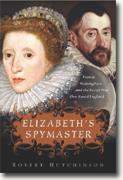Elizabeth's Spymaster
Robert Hutchinson
book reviews:
· general fiction
· chick lit/romance
· sci-fi/fantasy
· graphic novels
· nonfiction
· audio books
· author interviews
· children's books @
curledupkids.com
· DVD reviews @
curledupdvd.com
newsletter
win books
buy online
links
home
for authors
& publishers
for reviewers

 |
Elizabeth's Spymaster: Francis Walsingham and the Secret War That Saved England Robert Hutchinson Thomas Dunne Books Hardcover 400 pages August 2007 |
|
Click here to read reviewer Br. Benet Exton's take on Elizabeth's Spymaster. Elizabeth's Spymaster
Walsingham was basically the head of Elizabeth’s intelligence and secret police organization, ferreting out Catholic plots against the Queen or just general rebellions (though they all seemed religiously-motivated at the time) and doing an effective job at it. He was a brilliant tactician and willing to use torture to get what he wanted. He was also not above falsifying evidence in order to break up supposed plots. On the other hand, he is greatly credited, along with the ring of spies which he cultivated, with getting information on the Armada forming in Spanish waters for the imminent invasion. This was his greatest triumph, and Hutchinson effectively leads the reader along the path that Walsingham followed to get this information. The other main focus of Elizabeth's Spymaster What I found exceptionally fascinating about the book is how it portrays Elizabeth as a penny-pinching, irritable monarch who often went off into a rage when one of her counselors upset her. She’s vindictive, holding a grudge for long periods of time, and dismissive of many of her closest advisors when the mood suits her. She eventually relents and signs the death warrant for Mary, but when her Council carries it out before she can change her mind, she erupts and literally throws one of her counselors in prison for a while. She is portrayed as being overly cautious, wanting to make peace with Spain at almost any cost, and Walsingham often registers his frustration and disgust at the way she stymies his plots. In fact, he personally goes into debt to pay for some of his spies because Elizabeth won’t fund his position fully. It really is a fascinating look at her, and unfortunately I don’t know how accurate the portrayal is because I haven’t read much about her. My perceptions are based mainly on modern media, such as the movies, and thus it was quite a shock to see her like this. One other wonderful aspect of Elizabeth's Spymaster Hutchinson even provides a “Who’s Who” list of the various spies that Walsingham enlisted, including the fact that these are only the known (or possibly suspected) ones. There could easily have been many more. These names are cross-referenced with their aliases if they have one, and it’s a very thorough list. It’s intriguing to see just how extensive Walsingham’s network was, and all the various walks of life from which they came. Where Elizabeth's Spymaster It’s also tough to get a read on how Hutchinson views Walsingham (which admittedly can be a good thing, as we certainly can’t tell what his bias is). He alternates between crediting Walsingham with saving England and slyly taking potshots at current American policy by saying how well his methods would fit in with what’s going on today. Sometimes he appears to admire Walsingham and sometimes he appears to condemn him. Ultimately, Elizabeth's Spymaster Originally published on Curled Up With A Good Book at www.curledup.com. © Dave Roy, 2007 |
| Also by Robert Hutchinson: |
|
|
|
 Click here to learn more about this month's sponsor! |
|
| fiction · sf/f · comic books · nonfiction · audio newsletter · free book contest · buy books online review index · links · · authors & publishers reviewers |
|
| site by ELBO Computing Resources, Inc. | |
 Sadly, Hutchinson tries to make the book relevant by citing how comfortable Walsingham would be with today’s anti-terror laws and other aspects of the war on terror. Rather than blatantly pointing these things out, I would have preferred that Hutchinson let readers come to these conclusions themselves. These passages in the book feel clunky and unnecessary, but thankfully are mostly confined to the prologue. Other aspects of Hutchinson’s writing are better, though none of them stand out as marvelously gripping. Instead, he tells a basic history in a straightforward manner that doesn’t get too boring for the reader. He’s also picked an interesting subject, which definitely helps.
Sadly, Hutchinson tries to make the book relevant by citing how comfortable Walsingham would be with today’s anti-terror laws and other aspects of the war on terror. Rather than blatantly pointing these things out, I would have preferred that Hutchinson let readers come to these conclusions themselves. These passages in the book feel clunky and unnecessary, but thankfully are mostly confined to the prologue. Other aspects of Hutchinson’s writing are better, though none of them stand out as marvelously gripping. Instead, he tells a basic history in a straightforward manner that doesn’t get too boring for the reader. He’s also picked an interesting subject, which definitely helps.